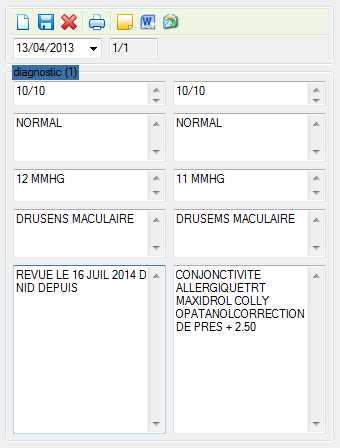
Miloud
Active Members-
Posts
24 -
Joined
-
Last visited
Recent Profile Visitors
The recent visitors block is disabled and is not being shown to other users.
Miloud's Achievements

Seeker (1/7)
3
Reputation
-
 Hashim reacted to a post in a topic:
get result of ShellExecute
Hashim reacted to a post in a topic:
get result of ShellExecute
-
ConsoleWrite(_getDOSOutput('ffmpeg -version', 'G:\ffmpeg\bin\') & @CRLF) Func _getDOSOutput($command , $wd='') Local $text = '', $Pid = Run('"' & @ComSpec & '" /c ' & $command, $wd, @SW_HIDE, 2 + 4) While 1 $text &= StdoutRead($Pid, False, False) If @error Then ExitLoop Sleep(10) WEnd Return StringStripWS($text, 7) EndFunc ;==>_getDOSOutput https://stackoverflow.com/a/16581169/6228030
-
The internet said that shellExecute() is suitable than run() when parameters are needed. This doesn't work either: Local $iRc = Run ( '"G:\ffmpeg\bin\ffmpeg.exe" "-version"' , "G:\ffmpeg\bin\") ;Local $iRc = Run ( '"G:\ffmpeg\bin\ffmpeg.exe" -version' , "G:\ffmpeg\bin\") ;Local $iRc = Run ( 'G:\ffmpeg\bin\ffmpeg.exe -version' , "G:\ffmpeg\bin\") ProcessWaitClose($iRc) $Message = StdoutRead($iRc) I need to get output from ffmpeg and determine wether commands finished execution!
-
Best way to compare multiple images? for a match.
Miloud replied to Neeeewbie's topic in AutoIt General Help and Support
I suggest that you use _Crypt_HashFile -
Winactivate not work for apllication in 64 bit
Miloud replied to DineshPawar's topic in AutoIt General Help and Support
In your function, you wrote WinActivated ... WinActivate works fine on my x64. Try this: opt("WinTitleMatchMode",2) WinActivate ( "[TITLE:كتب الشاملة]" ,"" ) ;كتب الشاملة is only a subscript of the full title! -
How to get the result of the command? My code : Local $iRc = ShellExecute ( "G:\ffmpeg\bin\ffmpeg.exe" , "-version" , "G:\ffmpeg\bin\") ProcessWaitClose($iRc) $Message = StdoutRead($iRc)
-
 Danyfirex reacted to a post in a topic:
Get contents_of_a_file (and its path) associated with an_application_built_with_autoIt
Danyfirex reacted to a post in a topic:
Get contents_of_a_file (and its path) associated with an_application_built_with_autoIt
-
Thank to: https://commandwindows.com/assoc.htm The solution is to add " %1" to the 5th line of the association script: FileExtAssoc("tcr0", "C:\Users\HP\Desktop\crypt\cryptIt.exe") Func FileExtAssoc($sExt, $sApplication) RunWait(@COMSPEC & " /c ASSOC ." & $sExt & "=ExTest", "", @SW_HIDE) RunWait(@COMSPEC & " /c FTYPE ExTest=" & $sApplication & ' "%1"', "", @SW_HIDE) MsgBox(0,"File Extension Application Association",'"' & $sExt & '"is now asscoiated with "' & $sApplication & '"',3) EndFunc
-
I imagine that your full-of-functions script looks like this: Func func1() ;.... EndFunc Func func2() ;.... EndFunc Func func3() ;.... EndFunc Here is my suggestion: 1- copy your script to msWord 2- run command replace by pressing ctrl+h 3- write on find "endfunc^p^pfunc" and in replace "endfunc^pfunc" and run it several times. 4- write on find "endfunc^pfunc" and in replace "endfunc^p|^pfunc" notice that the script should look like this: Func func1() ;.... Endfunc | func func2() ;.... Endfunc | func func3() ;.... EndFunc 5- save it as "myFunctions.txt" 6- after building the gui as suggested by Melba23 , make a command to open "myFunctions.txt", split its contents with "|", and write the needed functions on an external file with autoit extension then run it. You should consider that some of your functions require #include write an array of them.
-
Hi, I have associated a file extension "tcr" with my application using this script which I found on stackOverFlow FileExtAssoc("tcr", "C:\Users\HP\Desktop\crypt\cryptIt.exe") func FileExtAssoc($sExt, $sApplication) RunWait(@COMSPEC & " /c ASSOC ." & $sExt & "=ExTest", "", @SW_HIDE) RunWait(@COMSPEC & " /c FTYPE ExTest=" & $sApplication , "", @SW_HIDE) MsgBox(0,"File Extension Application Association",'"' & $sExt & '"is now asscoiated with "' & $sApplication & '"',3) EndFunc on my application: #include <Array.au3> #include <WinAPIShPath.au3> ; An alternative to the limitation of $CmdLine[] only being able to return a maximum of 63 parameters. Local $aCmdLine = _WinAPI_CommandLineToArgv($CmdLineRaw) _ArrayDisplay($aCmdLine) $t="" For $i=1 To $CmdLine[0] $t &=$CmdLine[$i] &@CRLF Next ClipPut($t) I want to get the path after running "myfile.tcr". Using the above script, it's possible if I drag the mouse over the file "myfile.tcr" and drop it on my my application... I want that to happen when I double click. Any suggestions please!
-
wow... I really appreciate your help... Thanks alot, it works now!
-
 Miloud reacted to a post in a topic:
Sciter Dll UDF !
Miloud reacted to a post in a topic:
Sciter Dll UDF !
-
Hello, the current udf isn't compatible with sciter.dll, though it opens the dll... Can you please provide a sciter.dll that is compatible with this udf! Will there be updates for this udf?
-
Thank you @AutoBert @Juvigy and @alien4u Here is approximately what I wanted : #include <_ClipPutHTML.au3> #include <Array.au3> $sPlainTextStr='1' & @TAB & '2' & @tab & '3' & @CRLF & '4' & @TAB & '5' & @TAB & '6' $sHTMLStr=toTable($sPlainTextStr) _ClipPutHTML($sHTMLStr,$sPlainTextStr) Func toTable($sPlainTextStr) $x=StringReplace($sPlainTextStr, @TAB, '</td><td>',0,2 ) $x=StringReplace($x, @CRLF, '</td></tr><tr><td>') $x='<table border="1"><tr><td>'&$x&'</td></tr></table>' ;MsgBox(0,0,$x) Return $x EndFunc Thanks to
-
Write this and see what happens While 1 @error=0 ;I think you may skip this line $sFileName = FileFindNextFile($hSearch) If @error Then ConsoleWrite("Error:"&@error); ExitLoop Else ConsoleWrite($sFileName) EndIf WEnd EndFunc


